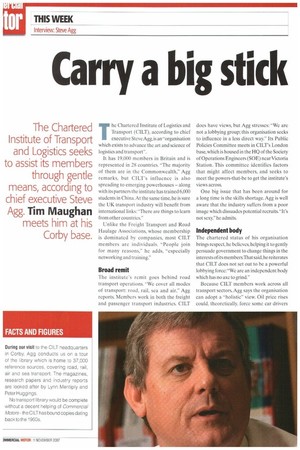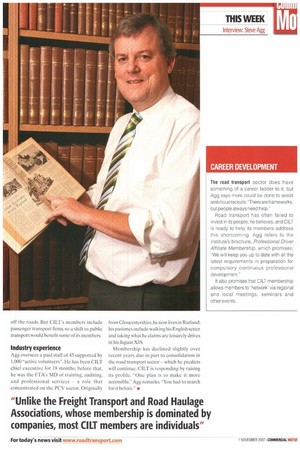Carry a big stick
Page 24

Page 25

If you've noticed an error in this article please click here to report it so we can fix it.
The Chartered Institute of Transport and Logistics seeks to assist its members through gentle means, according to chief executive Steve
Agg. Tim Maughan
meets him at his Corby base.
The Chartered Institute of Logistics and Transport (CILT), according to chief executive Steve Agg, is an "organisation which exists to advance the art and science of logistics and transport".
It has 19,000 members in Britain and is represented in 28 countries. "The majority of them are in the Commonwealth," Agg remarks, but CILT's influence is also spreading to emerging powerhouses along with its partners the institute has trained 6,000 students in China. At the same time, he is sure the UK transport industry will benefit from international links: "There are things to learn from other countries."
Unlike the Freight Transport and Road Haulage Associations, whose membership is dominated by companies, most CILT members are individuals. "People join for many reasons," he adds, "especially networking and training."
Broad remit
The institute's remit goes behind road transport operations. "We cover all modes of transport: road, rail, sea and air." Agg reports. Members work in both the freight and passenger transport industries. CILT does have views, but Agg stresses: "We are not a lobbying group; this organisation seeks to influence in a less direct way." Its Public Policies Committee meets in CILT's London base, which is housed in the HO of the Society of Operations Engineers (SOE) near Victoria Station. This committee identifies factors that might affect members, and seeks to meet the powers-that-be to get the institute's views across.
One big issue that has been around for a long time is the skills shortage. Agg is well aware that the industry suffers from a poor image which dissuades potential recruits. "It's not sexy:" he admits.
Independent body
The chartered status of his organisation brings respect, he believes, helping it to gently persuade government to change things in the interests of its members.That said, he reiterates that CILT does not set out to be a powerful lobbying force: "We are an independent body which has no axe to grind."
Because CILT members work across all transport sectors, Agg says the organisation can adopt a -holistic" view. Oil price rises could, theoretically, force some car drivers off the roads. But CILT's members include passenger transport firms, so a shift to public transport would benefit some of its members.
Industry experience
Agg oversees a paid staff of 45 supported by 1,000 -active volunteers". He has been CILT chief executive for 18 months; before that. he was the ETA's MD of training, auditing. and professional services a role that concentrated on the PO/ sector. Originally from Gloucestershire, he now lives in Rutland; his pastimes include walking his English setter and taking what he claims are leisurely drives in his Jaguar XIS.
Membership has declined slightly over recent years, due in part to consolidation in the road transport sector which he predicts will continue. CILT is responding by raising its profile. "One plan is to make it more accessible," Agg remarks. "You had to search for it before." •






















































































































































































